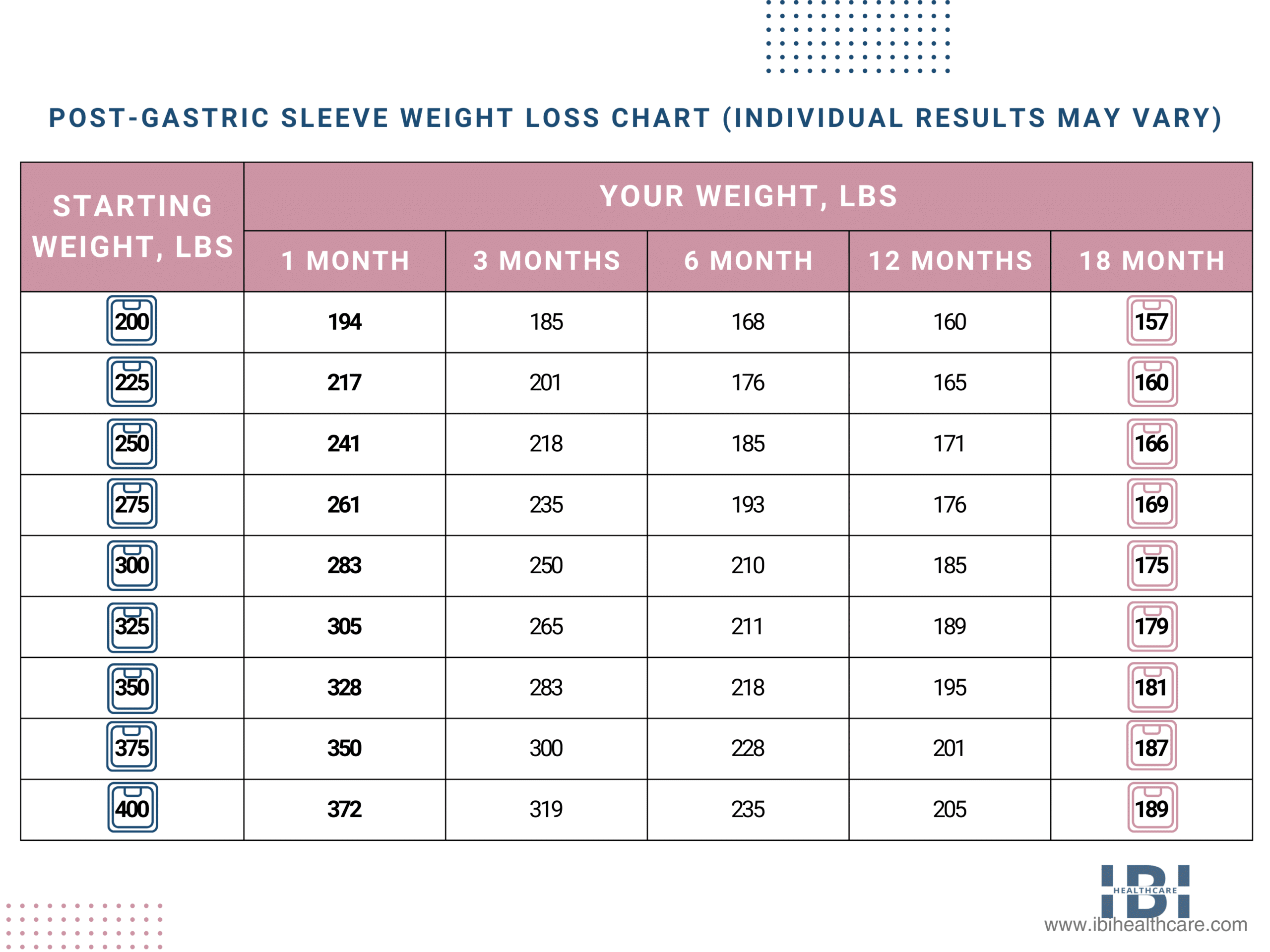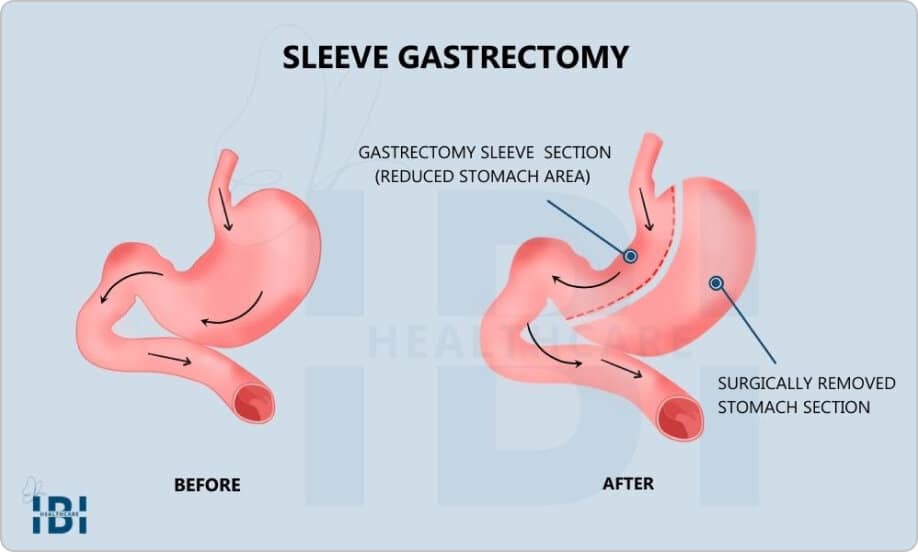Weight Loss Timeline is important to understand the crucial post-op phase after gastric sleeve surgery. Explore the healing timeline, post-operative care tips, and how to gradually resume regular activities.
The main reason for undergoing bariatric surgery is to assist a patient in losing weight. Improving their health by reaching and maintaining a healthy body mass index BMI. Gastric sleeve surgery is often chosen after unsuccessful traditional weight loss attempts. Weight loss surgery offers a potent advantage: aiding individuals to shed pounds more quickly than traditional methods allow.
Gastric Sleeve Weight Loss Timeline
Statistics indicate that weight loss numbers after gastric sleeve surgery seem to follow a pattern of milestones. These milestones seemed to be more evident at 3 months, 6 months, 12 months, and 18 months.
- The first 3 months showed the most weight loss in the shortest amount of time.
- By the 6-month mark, patients should have reduced their excess weight by 30-40%. After six months, weight loss slows to 1-2 pounds monthly for patients, leveling out from that point onward.
- At the 12-month point, patients should be close to their goal weight if they have not reached it already.
- At the 18-month point, weight loss normally transitions to a maintenance phase and plateaus. To achieve more weight loss, the patient needs to incorporate something into their routine to jump-start and facilitate ongoing weight loss. The patient can sustain this weight by maintaining healthy dietary choices, lifestyle decisions, and exercise routines.
How Much Weight Can You Lose after a Gastric Sleeve?
Patients who have had gastric sleeve surgery normally lose between 50% and 60% of their excess body weight in 12-18 months. If patients follow their dietary restrictions and exercise programs diligently they may lose more. Each patient’s results can vary depending on their starting BMI, weight-related health issues, age, and other factors. The following chart is a basic example of projected total weight loss following gastric sleeve surgery.
Considering weight loss surgery? Interested in gastric sleeve? Seek a timeline for gastric sleeve weight loss to anticipate outcomes. Averages, subject to variations, hinge on initial BMI, health issues, and lifestyle choices, influencing patient-to-patient differences.

Both gastric sleeve surgery and non-surgical endoscopic sleeve gastroplasty can result in significant weight loss for higher-weight patients. The timeline for weight loss may be slightly different for each procedure but if the patient is diligent in following their diet and exercise plan, they have the potential to reach their weight loss goal and maintain it into the future.
What is Gastric Sleeve Surgery?
Over the past few years, Laparoscopic Sleeve Gastroplasty (LSG) has become the most popular weight loss surgery performed. Gastric sleeve reduces the stomach size by approximately 70 to 80%. A portion of the stomach is surgically removed and the remainder is stapled together in the shape of a small pouch. This allows for only a limited number of calories and nutrients to enter the digestive system.
Gastric sleeve surgery has a high success rate, is less complicated, and has minimal risk factors when compared to Gastric Bypass Surgery. LSG requires a hospital stay of 1-3 days and has an extended recovery time of approximately 4-6 weeks.
After undergoing gastric sleeve surgery, the smaller stomach limits the amount of food that the patient can eat. The procedure also removes the portion of the stomach that produces the “hunger-causing” hormone ghrelin so it suppresses the appetite. The smaller stomach empties more slowly so it prolongs the feeling of satiety.
See the below picture of the stomach after gastric sleeve surgery.

What is Endoscopic Sleeve Gastroplasty?
Endoscopic Sleeve Gastroplasty (ESG) is a non-surgical procedure that delivers results that are very close to those of gastric sleeve surgery only WITHOUT the surgery.
Like gastric sleeve surgery, ESG makes the stomach smaller so the patient can only consume a very small amount of food in one sitting. The surgical sleeve reduces the stomach by about 80% while the endosleeve reduces it by around 70% but weight loss potential is very similar if utilized correctly.
ESG is an outpatient procedure, does not require any hospital time, has fewer risks than the gastric sleeve, and recovery time is quick so you can get back to your normal routine in no time at all!
How Much Weight Do You Lose After Endosleeve?
With ESG, individuals can expect to lose approximately 20-23% of their total body weight in the first 12 months. For example, a patient who currently weighs 250 pounds should lose about 25 pounds in the first 3 months and at the 12-month mark should weigh in the range of 192-200 pounds.
A study published in April 2019 examined bariatric patients who underwent both gastric sleeve surgery (LSG) and endoscopic sleeve gastroplasty (ESG). The significant findings of the study revealed that the LSG patients outperformed the patients in the ESG group in weight loss by 7%. However, the ESG group reported significantly fewer complications, with rates of 5.2% compared to 16.9% in the LSG group.


How Much Weight Do You Lose in the First Month after Gastric Sleeve?
Gastric sleeve surgery motivates rapid weight loss, particularly in the initial month, creating significant and dramatic changes for patients. Following gastric sleeve surgery, the first month often sees rapid weight loss; such swift progress might not continue. This happens because of the drastic calorie reduction before and after surgery, for about a month, affecting consumption and expenditure.
Most patients start a full liquid diet for 2 weeks before the surgery and then a clear liquid diet from 2 days before to a few weeks after the surgery. Gradually, the patient will add soft foods and work up to solids but the first few months are a process.
Patients must be determined to persevere through this period because although it is the time of the most weight loss, it is also one of the toughest periods. The reward is well worth it because, during this first month, patients will normally lose between 10% and 15% of their excess body weight. In addition, patients who suffer from weight-related health issues may be starting to see some relief in those areas.
How Is Excess Body Weight vs. Total Body Weight Calculated?
Excess body weight is calculated by first choosing your goal weight which is also sometimes called “ideal weight”. Ideal weight can be found using a BMI calculator which will provide a healthy weight range. Then using your current weight, subtract your “ideal weight” and this determines how much excess weight you need to lose to reach your goal weight.
Example: How to Calculate Ideal and Excess Weight
Patient A, a woman, currently weighs 250 pounds and is 5’4” tall. According to the BMI calculation using her height, her ideal weight is somewhere between 108 and 145. So for this example, we will choose a goal weight of 127 which is in the middle.
Subtracting 127 from 250 reveals her excess weight, indicating her progressive goal of losing 123 pounds.
Going a step further, most patients lose 10-15% percent of their excess body weight the first month post gastric sleeve. At the end of the initial month after surgery, her weight would drop by 12-18 pounds, reaching 238-232 pounds.
While individual results vary, these bariatric before-and-after stats generally provide a reasonable representation of outcomes. Research indicates that greater initial excess weight leads to higher initial weight loss during the initial months for individuals.
IBI Healthcare Institute assists in selecting the ideal weight loss procedure, promoting both weight loss and healthier living. Contact our office today for a personal consultation.











